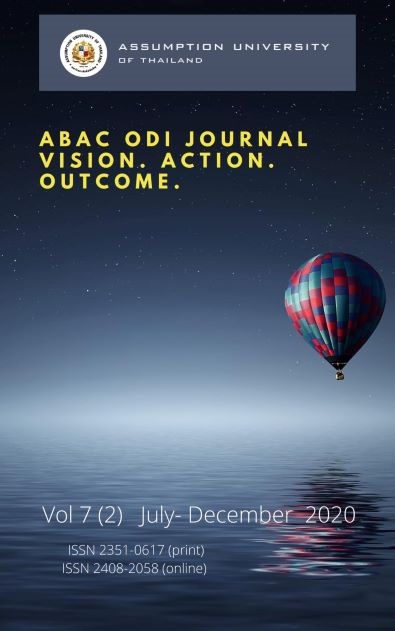A Proposed Improvement Plan on Competencies and Skills Using Generative Analysis Approach: A Case of the Staff of the Office of Graduate Studies Assumption University of Thailand
Keywords:
human resource, competency, skills, communication, problem solving, decision makingAbstract
The employees’ success at the workplace depends on their competence and skills to match job needs and make significant achievements to the institutional goals. The competency of employees within institutions depends on the knowledge, skills, and experience. The study focused on the identification of an improvement program on employee competency and skills within the office of graduate studies. The study demonstrated that the graduate school of business management plays an essential role in ensuring the employees attain the right competency and skills. The study employed a phenomenology approach as a part of qualitative research, using in-depth interviews for data collection, contents analysis, and interpretation. The key variable of the study included abilities on problem-solving, decision making, communication, teamwork, adaptability, and customer focus. The data analysis demonstrated varied results on the components depending on the measured variables. The findings indicated require action to improve employee competency, skills, and job performance. The office of the graduate studies improvement plan (OGSIP) focused on each analyzed component and was essential to improve the competence and skills of the employees within the institution. The framework of the improvement plan includes preparation and assessment, planning, implementing, and monitoring. Further studies recommended comprise the research on advancing performance improvement plans and the involved challenges.
References
Abas, C., & Imam, O., (2016). Graduates' Competence in Employability Skills and Job Performance. International Journal of Evaluation and Research in Education, 5 (2), 119-125.
Bertram, R.., Blase, K.., & Fixsen, L. (2015). Improving programs and outcomes: Implementation frameworks and organization change. Research on Social Work Practice, 25(4), 477-487.
Brandi, U., & Iannone, R. (2017). Learning strategies for competence development in enterprises. Industrial and commercial training, 49 (1), 1-5.
Brewster, C., Chung, C., & Sparrow, P. (2016). Globalizing human resource management. Routledge.
Clokie, T., & Fourie, E., (2016). Graduate employability and communication competence: Are undergraduates taught relevant skills? Business and Professional Communication Quarterly, 79(4), 442-463.
Joshi, M., Singh, V., & Sharma, N. (2018). Empirical Examination of Relationship between Organizational Culture and Employee Competence: An Insight. SAMVAD, 16(2), 25-36.
Potnuru, R., & Sahoo, C., (2016). HRD interventions, employee competencies, and organizational effectiveness: an empirical study. European Journal of Training and Development, 40(5), 345-365.
Rajagopal, A., (2019). Relationship between Employee Mobility and Organizational Creativity to Improve Organizational Performance: A Strategic Analysis. In Business Governance and Society, Cham: Palgrave Macmillan
Starc, J., Neuberg, M., &Erjavec, K. (2017). Employees’ satisfaction with the use of communication channels by their nurse managers in Croatia and Slovenia. Management: journal of contemporary management issues.
Storey, J. (2007). Human resource management: A critical text. Cengage Learning EMEA.
Hogan, A., Knez, N., & Kahng, S. (2015). Evaluating the use of behavioral skills training to improve school staffs’ implementation of behavior intervention plans. Journal of Behavioral Education, 24(2), 242-254.
Żukowska, J. (2016). effectiveness measures of forms to improve employee competences− case studies. Research Papers of the Wroclaw University of Economics/Prace Naukowe Uniwersytetu Ekonomicznego



